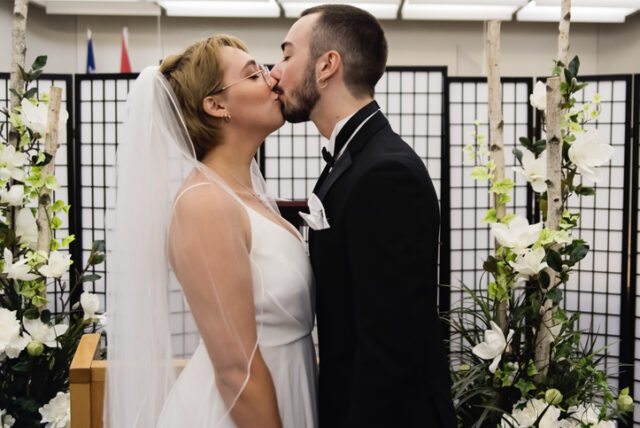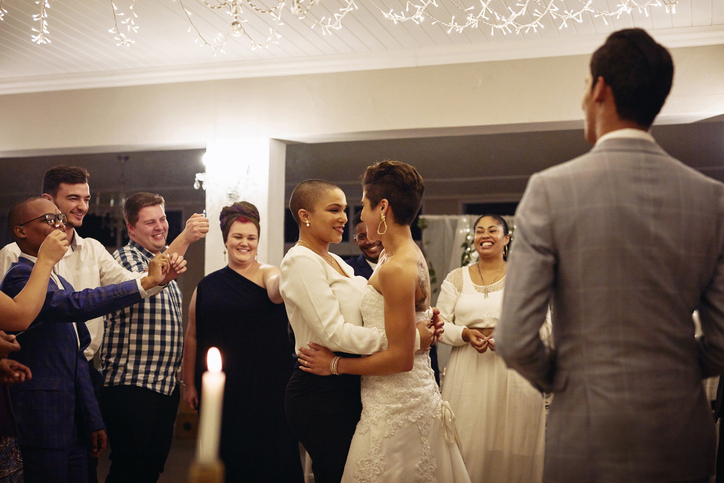As soon as you have a ring on your finger, it’s easy to get swept up in finding the perfect venue, having your heart set on that one photographer, and generally believing that your wedding will be the most significant day in your life. While of course it’s fun to be excited and you deserve a great wedding day, sometimes a long engagement can be more work than it’s worth. There are many benefits to saying “I do” just a few months after you decide to commit to your person.
1. You’ll focus on your marriage, not on having the perfect wedding.

You’ll be glad you had a short engagement because it forces you to think about what marriage means. You won’t be tempted to plan a fancy wedding that everyone will be impressed by. You’ll talk about what it’s going to be like when you’re married, not on one day that will be wonderful but shouldn’t be the best day of your lives since there are going to be so many that come after it.
2. You’ll set an important precedent of not letting other people influence your marriage.

When you announce that you’re getting married in six months or even less, your friends and family might be shocked that you’re not taking more time to settle into the engagement and get ready for the big day. That’s okay. You can stand strong and remember that you’re doing what feels right for you and your partner. A short engagement will prove that the two of you are in sync and that you do what you want, not what other people think you should. This will inspire you both to take risks and follow your hearts throughout the rest of your marriage.
3. You’ll cut back on wedding planning stress, which could affect your relationship.

When you have a long engagement, it’s hard not to get caught up in feeling overwhelmed about flower colors, seating charts, and whether you should send paper or email invitations. When you don’t have a lot of time to plan, you won’t be as overwhelmed as you could be, which will be a gift. Even the healthiest couples fight during this process, and some of those arguments can be pretty bad since families are involved and emotions are heightened. You’ll have to make fast decisions and then move on, and you’ll both be better for it.
4. You’ll have the wedding you really want, which will give you both confidence that you can ignore outside influence.

If you shorten the timeframe from engagement to walking down the aisle, you’ll be able to make the ceremony and reception exactly what you and your partner want because you’ll have to make decisions fast. Even if you start to worry that your color scheme is wrong (or think maybe you should have a color scheme because you don’t currently have one), you can move on quickly. You’ll become newlyweds while knowing that you’re both confident in who you are as a couple and that you don’t need to listen to other people in order to be happy.
5. You can save money, which will set you and your partner up for financial success.

While people say money can’t buy you happiness, it does cause a lot of terrible fights, especially when newlyweds are figuring out if they’re on the same page. Whether you want to spend some money on engagement photos or you want to avoid most traditions, a shorter timeframe from engagement to wedding will mean there just isn’t time for all the pre-wedding events that many people enjoy doing. This will help you and your partner put some cash away, which you can use for a great honeymoon, a down payment on your first home, or a dream trip in the future. You’ll both have some peace of mind, which will make you happier.
6. You’ll avoid the frustrating and upsetting post-wedding blues.

No matter how much you love your partner, it can be tough to settle into regular life after having a great time planning a wedding for a year or more. With a shorter engagement, you won’t spend as much time thinking about how your wedding has to be The Perfect Day. You’ll still live your life in the meantime, and you’ll have a better time getting back into your routine after. This will make you and your partner much more content, since you won’t obsess over your wedding when it’s over and wish that you could get that day back.
7. You’ll both remember what’s important: the love you have for each other, not that dream dress or venue.

When you get married just a few months after deciding to spend the rest of your lives together, you say goodbye to the cool brewery you always wanted to get married in and that image of the most beautiful wedding dress you’ve ever seen. That dress might take eight months to get here (and then you have to get it tailored, which adds even more time) and that venue has a year-plus waiting list. This will help you both clear out the clutter and remind yourselves that you’re doing this because you care about each other. Nothing else matters.
8. You can get started on your shared dreams earlier.

Do you want to have kids? Or start a business together, whether a side hustle or full-time gig? What about finding a condo or house in your dream neighborhood? When you don’t wait that long to get married, you and your spouse can get a head start on the things that you want to accomplish together. You’ll be able to jump right into the life you want to live. You’ll still have hard times and obstacles, and maybe realize your marriage has gotten a little dull in the future. But you’re laying a great foundation of supporting each other and making your goals happen.
9. You’ll listen to each other more and learn proper communication.

If one of the biggest hurdles to a happy marriage is figuring out how to communicate, a brief engagement could set you both up for success. When you’re not bogged down in planning details that aren’t really all that important, you’ll listen to what you both want and take that into account more. You’ll figure out your communication style sooner, which will be helpful. You don’t want to set a precedent of giving each other the silent treatment when you’re mad or not talking things through when you’re upset, and you might fall into bad patterns through a long, stressful wedding planning process.
10. You’ll still have time to nurture your relationship now, which will result in a better marriage later on.

It’s easy to get bogged down in planning a wedding that’s happening two years from now and put everything else on hold… including your relationship. Since your planning timeframe will only be a few months, you’ll be able to focus on your bond in the meantime. Instead of forgoing regular date nights for planning meetings and not having any fun together because you’re busy thinking about details all the time, you can still spend time with each other. This will go a long way toward ensuring your relationship is solid when you tie the knot.
11. You’ll remember the good times you shared while married instead of focusing on your wedding day.

When you have a long engagement, you might end up putting too much stock in your wedding day, which can set you up for problems later on. You spend so much time thinking about this one day that you might build it up and put too much pressure on it. If you get married shortly after getting engaged, you can focus on the happiness of your marriage instead of the way you look in all those beautiful wedding photos. Your engagement and wedding will be a blip in the amount of time you spend together.
12. You’ll learn how to be resilient and solve problems together.

If mistakes and mishaps happen during wedding planning, even more issues are going to come up when you don’t have long to set everything up. You and your partner will learn valuable skills and be total pros at solving problems quickly. This will set up your marriage since life has so many inevitable highs and lows and you need to be able to get through those times without falling apart.
13. You’ll both be involved in wedding planning, which will help you bond more and prove you’re a strong team.

Often, when you’re engaged for longer than one year, you might find yourself taking charge of the process and not involving your partner as much as you should. You’re not trying to be a jerk, this is just what tends to happen. If you don’t have a ton of time between your engagement and wedding, it’ll be an all-hands-on-deck kind of situation trying to get things done. You and your partner will work together, talk about what you want, and feel even more connected as you head into marriage.
14. You might find yourselves compromising more easily.

Compromise can be a tough part of marriage, but if you have a brief engagement, maybe you or your partner actually wants to elope or go to city hall. Since you don’t have a long planning process, this could be easier to agree to. While of course you want to do what makes your partner happy, sometimes it’s easy to get caught up in the thrill and magic of having a big wedding. But if you cut down on the planning time, you can see things more clearly. You’ll then be in the habit of compromising, which will be great for your marriage.
15. You’ll avoid too much input from family, which can derail a wedding and affect your relationship.

The worst part of wedding planning just might be unsolicited advice from family… or, worse, arguments over seating charts (and why that cousin wasn’t invited) and so much more. Relatives can make you so miserable that you question why you’re doing this in the first place. But if you get married fast, that cuts down on time to fight or have tension, which will keep your relationship in a healthier place. You’ll also learn to stand on your own as a couple and not get influenced by your well-meaning relatives.




